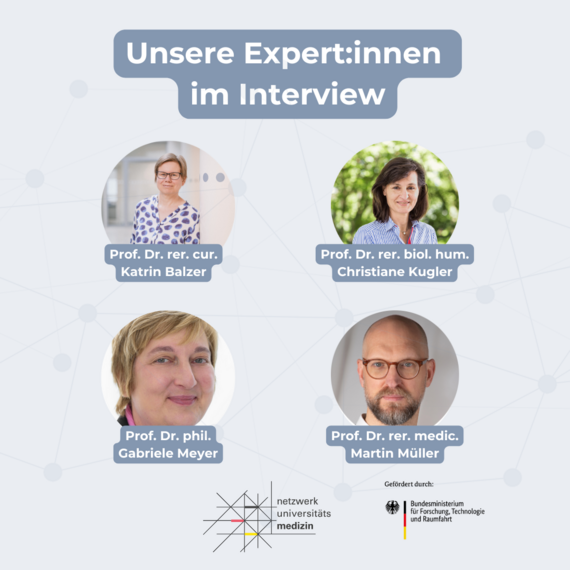Why is it important to integrate nursing science more closely into university medical research? (Martin Müller)
Nursing science as a subject in Germany is comparatively young and - in contrast to almost all other Western countries - underdeveloped. This becomes clear when you realise that there are currently 16 nursing science professorships in university medicine, which are intended to provide evidence for clinical decisions for the largest professional group by far. Up to now, nursing research in Germany has mainly taken place in long-term care, where it has provided important impetus, e.g. in the avoidance of measures that deprive people of their liberty or the reduction of falls or violence. For various reasons (which we describe in more detail here), there has been very little nursing research in acute care to date. This absolutely must change, and the Network of University Medicine is an initiative that we absolutely must utilise. Nursing research must be given greater consideration and integrated because the NUM basically has the infrastructure that allows high-quality and practice-relevant studies. This includes both large multi-centre clinical studies and studies with existing data sets, for example to understand care needs or validate measurement instruments.
Where do you see the greatest untapped potential for nursing science research within the NUM? (Katrin Balzer)
This is actually quite easy to answer: the vast majority of care pathways in university medicine are interprofessional and nurses are key guarantors for the success of treatment and patient safety, for prevention and the promotion of recovery. The focus is on case responsibility, which is achieved through direct care, but also guidance and counselling. These perspectives are underused in the design of innovative care programmes and in clinical studies, as is the specific clinical expertise that nurses have.
Which methodological approaches of nursing science can be particularly well integrated into research in the NUM? (Gabriele Meyer)
One methodological approach that appears to be new and very innovative in research in Germany is the UK Medical Research Council's concept of complex interventions. In a nutshell, the concept attempts to develop and evaluate care programmes (complex and less complex) in such a way that their introduction into practice is considered from the outset. The aim is to understand both whether interventions are effective in terms of patient-relevant outcomes and to understand why and under what conditions they work. German nursing scientists have been working on complex interventions for over a decade and are centrally involved in the international discourse. It is undisputed that this approach offers real added value for clinical studies and thus innovations in healthcare. With this expertise, nursing science offers a relevant contribution to the design of complex randomised controlled trials that goes beyond the standard repertoire. There is also great expertise in the area of evidence synthesis, in the context of participatory research and public and patient involvement. Another very important dimension of expertise is qualitative research, which must be used in many areas in order to recognise needs, develop theories and understand processes.
How can collaboration between nursing science and other disciplines be strengthened within the NUM? (Christiane Kugler)
One important aspect must be clarified before the question of collaboration is addressed: What are the specific nursing research questions? Nursing practice, and thus nursing science, does not look at patients and their families through the lens of medical disciplines with their strong organ or functional focus, but rather with a focus on how individuals and groups can be strengthened in their ability to cope with everyday life in the context of health challenges. Once this is clear, we can discuss how nursing science can enrich medical research. This has long been clear in many areas, such as intensive care medicine, rehabilitation, geriatrics and palliative care. In other disciplines, there is still work to be done to raise awareness - which our colleagues are happy to do.
How can the NUM contribute to putting nursing science topics on the strategic agenda of university medicine? (Martin Müller)
From our point of view - and I speak for the colleagues at the medical faculties - nursing science must be integrated into the NUM community platform. This is the only way we can help shape and express our needs, e.g. for a core nursing data set that must be kept available in the infrastructure. Or our requirements for the implementation of clinical studies, which can then be integrated into the NUM infrastructure. In other words, there must be a FOSA or working group on nursing science that is involved in NUM. Finally, I would like to emphasise that in reality it is already working very well to exchange ideas with the medical disciplines and develop joint study ideas. We successfully "networked" in the NUM 3.0 call for proposals and only just failed to achieve a quorum with our idea for a study network on frailty together with geriatrics and medical informatics. Now we just need to be formally docked!
Our interview partners:
Prof. Dr rer. cur. Katrin Balzer, Professor of Evidence-Based Nursing, Head of the Section for Research and Teaching in Nursing, Institute of Social Medicine, University of Lübeck, Academic Medical Center Schleswig-Holstein, Lübeck Campus
Prof. Dr rer. biol. hum. Christiane Kugler, Director of the Institute for Nursing Science, Albert-Ludwigs-Universität Freiburg
Prof. Dr phil. Gabriele Meyer, Director of the Institute of Health, Midwifery and Nursing Science, Faculty of Medicine, University Medicine Halle, Martin Luther University Halle-Wittenberg, Co-Speaker of the Working Group Nursing Science at the Medical Faculties in the German Society for Nursing Science
Prof. Dr rer. medic. Martin Müller, MPH, Professor of Nursing Science and Interprofessional Care, Department of General Medicine and Health Services Research, Medical Faculty of the University of Heidelberg, Co-Speaker of the WG Nursing Science at the Medical Faculties in the German Society for Nursing Science



